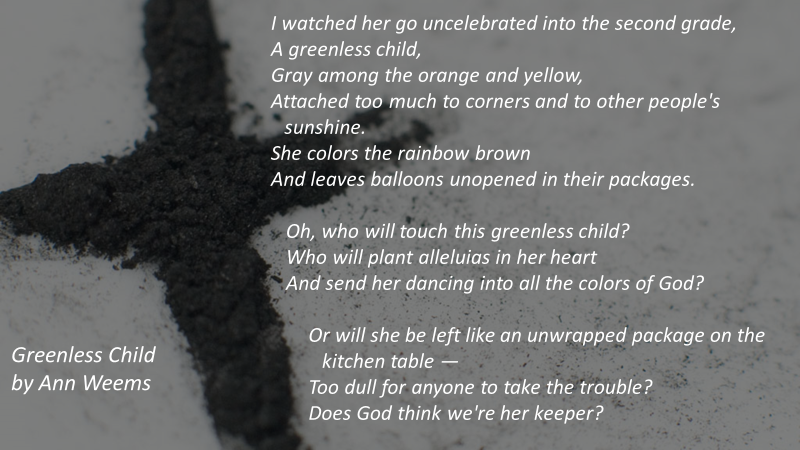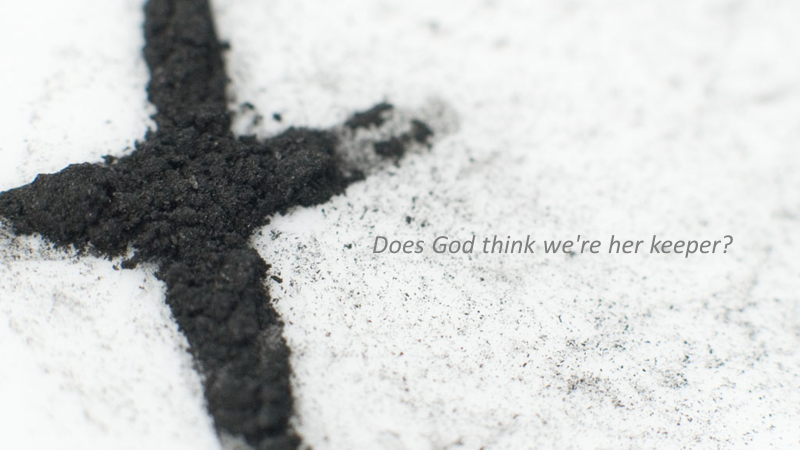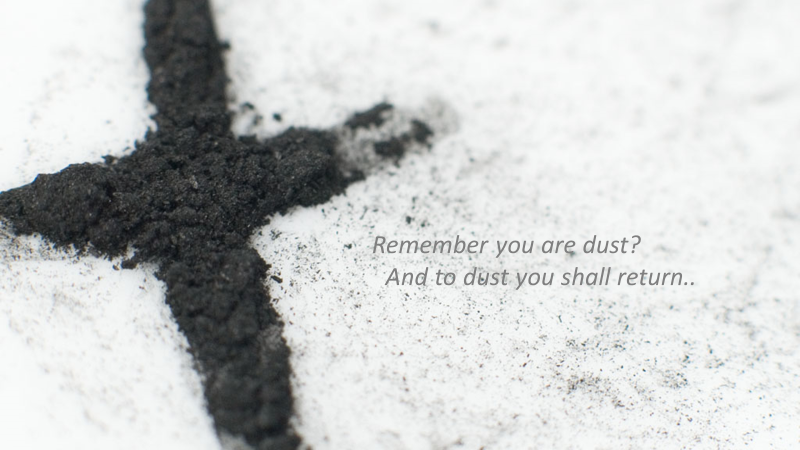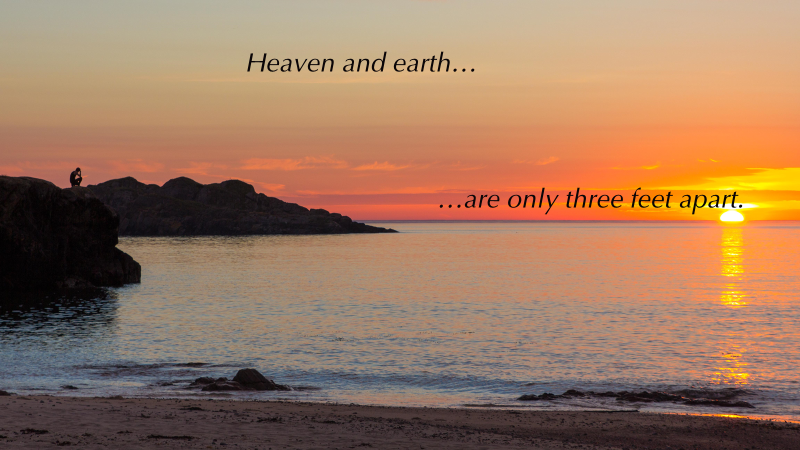Scott AndersonExodus 24:12-18 † Psalm 2 † 2 Peter 1:16-21 † Matthew 17:1-9 When you are out in the wilderness and you see a big cloud coming, you start to look for shelter. You don’t need to be an expert hiker to know this. You feel it first. This is especially true when you are up high and exposed. Conditions can change in an instant, and if you are not prepared, you can find yourself in danger far more quickly than you would imagine down here near sea level, among the trees. And yet, many of us—especially in this region—are drawn to the mountains and the wilderness and the unknown, despite the inherent dangers. We are looking for something, it seems, that we do not regularly encounter. We are seeking something that cannot be readily obtained in the ordinariness of our day-to-day lives here in the lowlands. “I’m drawn to places,” writes Eric Weiner, “that beguile and inspire, sedate and stir, places where, for a few blissful moments I loosen my death grip on life, and can breathe again.”[i] Heaven and earth, the Celtic saying goes, are only three feet apart. Yet these ancient seekers knew that in some places—they called them “thin places”—the distance is even shorter. There is something about these places. You feel it when you’re there. And they are everywhere. Like up near Lake Tipsoo on the edge of Rainier National Park and the mountain the early settlers of this land knew as Tahoma.
0 Comments
Scott AndersonDeuteronomy 26:1-11 † Psalm 91:1-2, 9-16 † Romans 10:8b-13 † Luke 4:1-13
Possession is nine-tenths of the law. No doubt you’ve heard this adage that suggests that if you possess something, you have a stronger legal claim to owning it than someone who merely says they own it. The doctrine allowed Floyd Hatfield to retain possession of the pig that the McCoys claimed was their property, although we can imagine it didn’t make their lives better or help to de-escalate the historic dispute between the Hatfields and McCoys. The old saw has underlined feuds on too many school playgrounds to count. It has destroyed countless friendships. It has been front and center in disputes in U.S. history with tragic results for many of the early dwellers of these lands. It has contributed to the fire between Palestinians and Israelis, and all of their proxies, and in too many stories to tell on every continent throughout every age. The question of ownership and land is arguably at the root of every conflict, all human violence, and the climate change peril that our planet and its inhabitants are facing. So it may interest us to note that this is something of a theme in the telling of our scriptures today. Scott Anderson Isaiah 64:1-9 † Psalm 80:1-7, 17-19 † 1 Corinthians 1:3-9 † Mark 13:24-37
There is no less light in the world. I understand this may be difficult for us to imagine on these days in our Pacific Northwest when light seems to be such a scarce commodity. The comments began soon after we said goodbye to Daylight Saving Time and gave ourselves that extra hour of sleep—a brief reward for the inundation of darkness that now affords us only 8 hours and change of this dripping, gray miasma we now call daylight. If you commute, you probably go to work and come home in this blanket of darkness. The same is true for school. It can be overwhelming. Especially so, perhaps, this year. But, unless you believe in a flat earth, and the heavens as some kind of a literal canopy above it, we know this is simply a matter of perspective. There is no less light in the world. We are simply spending more time in the shadows these days as our earth has begun that part of its travels around the sun that radiates more energy and light on the southern hemisphere than the northern. It’s a matter of perspective. The sun shines just as bright. The light is there, along with the dark. It always is. It’s just that we don’t get the same angle on it that we do in those July days when the light lasts for 16 hours and the darkness is almost non-existent to those of us who go to bed by ten or wake up after five. It’s a matter of perspective, and timing, this relationship we have to darkness of all sorts. There is this tension in us, we creatures who live on this fragile earth. Call it circadian if you wish. We are circadian Cascadians, you and I. We are defined and limited and bounded in time and space. We oscillate between wanting to tear down and wanting to construct. Sometimes the first is necessary in order to do the second. Sometimes that destructive voice is just the first voice—the voice of pain and isolation and vulnerability that wants to tear open the heavens and let the light shine through the darkness, that wants the earth to shake so someone else might feel what you feel, that wants others to taste the tears that have been your bread for so many nights under these stars. Parker Palmer captures this insight, I think, when he suggests that violence “is what we get when we do not know what else to do with our suffering.” So Mark imagines what Isaiah craves: The stars begin to fall when God tears through the fabric of the heavens to come down to earth to fix everything. Wouldn’t that be some good news! All the abusive and opportunistic powers of the world, all the lesser lights give way to the one true light, the one true power, the one true Love that can fix all that is broken. Scott Anderson Ezekiel 34:11-24 † Psalm 100 † Ephesians.1:15-23 † Matthew 25:31-46
It’s all hindsight. All of it. No one was doing what they were doing in the parable because they thought they were doing it “unto Christ.” They were just doing it. It was just what they did or didn’t do. Everyone was surprised, in other words. Everyone was surprised that this would be the thing that would set them apart—right from left, sheep from goats. When did we see you hungry or thirsty, or a stranger or naked, or in prison? Which kind of begs the question. What were they expecting? Not so much for the goats. We know all-too-well the world in which people do “goaty” things, do for themselves, vote for their own interests, look out for number one, shove and claw and occupy and foul more space than they need to. This story is as old as the hills, or at least as old as Ezekiel who sounds like a modern-day prophet for climate change. “Is it not enough,” the prophet asks, for you to feed on the good pasture, but you must tread down with your feet the rest of your pasture? When you drink of clear water, must you foul the rest with your feet? And must my sheep eat what you have trodden with your feet, and drink what you have fouled with your feet?[i] There’s more than enough of that to go around. And, of course, we know that part in us. Because we all have a little sheep, a little goat—we all have contested space within us, a DMZ between Thanksgiving feeding at the REACH meal and that feeding-frenzy we call Black Friday. But they were all surprised—sheep and goats together. No one was expecting this. It just kind of surfaced. So if it wasn’t about pleasing, about caring, about serving as a way to meet the holy, to do it “unto Christ,” what was the motivation? Why did they do it? What did it mean? What does it say? Scott Anderson Readings for this Sunday:
1 Samuel 8:4-11, 16-20 | Psalm 138 | 2 Corinthians 4:13-5:1| Mark 3:20-35 I’ve preached this Mark text a number of times in the past, but I had never really noticed before that Jesus goes home. I don’t know about you. I don’t really think about Jesus as one who had a home. But that’s where he is. He’s home—apparently where he grew up. This is reinforced at the end of this section when Jesus’ mother and brothers show up. But this turn doesn’t seem to make home any homier. They think he’s gone too far, and the way Mark tells the story, their attempt to restrain Jesus is perhaps the greatest injury, personal rejection piled onto the charges made against him by the religious authorities from Jerusalem. Maybe the question isn’t “Can you go home again?” but “Why would you want to?” What a blow this must have been! Many of us know the complexities of family life. Our hunger for the idea of home is all the greater because those places where we would expect to find home are sometimes the places of our most infrequent encounters. Ask any therapist. We spend our lifetimes working in one way or another to make sense of our family ties, to live out from under them, to allow them to fund our strength and courage and wholeness. The majority of my pastoral conversations have some element of family in them, and I suspect the ones that don’t are lacking that dynamic only because I’m not paying close enough attention. |
St. Andrew SermonsCategories
All
|




 RSS Feed
RSS Feed